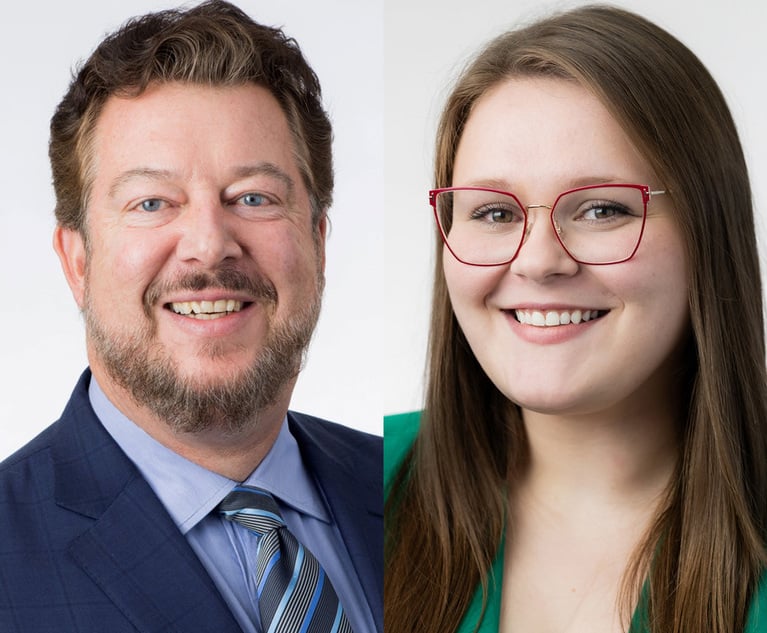 L-R: James C. Haggerty, Dennis Coyne and Jeffrey Stanton of Haggerty, Goldberg, Schleifer & Kupersmith. Courtesy photos
L-R: James C. Haggerty, Dennis Coyne and Jeffrey Stanton of Haggerty, Goldberg, Schleifer & Kupersmith. Courtesy photosThe Coordinate Jurisdiction Rule on Insurance Bad Faith Litigation
The recent decision of the Pennsylvania Supreme Court in Ivy Hill Congregation of Jehovah’s Witnesses v. Department of Human Services, regarding the coordinate jurisdiction rule may result in the dismissal of subsequent challenges raising issues which have previously been adjudicated in the course of the litigation. The coordinate jurisdiction rule precludes re-litigation of an issue that has been previously decided in the context of a lawsuit.
January 10, 2025 at 11:55 AM
6 minute read
In insurance bad faith cases in Pennsylvania, insurers routinely incrementally challenge claims by insured parties, reasserting the same arguments at different procedural stages, such as in preliminary objections, motions for judgment on the pleadings, and motions for summary judgment. In many counties across Pennsylvania, including Philadelphia, different judges are assigned to decide motions at various stages of a case. The recent decision of the Pennsylvania Supreme Court in Ivy Hill Congregation of Jehovah’s Witnesses v. Department of Human Services, 310 A.3d 742 (Pa. 2024) regarding the coordinate jurisdiction rule may result in the dismissal of subsequent challenges raising issues which have previously been adjudicated in the course of the litigation. The coordinate jurisdiction rule precludes re-litigation of an issue that has been previously decided in the context of a lawsuit. This rule applies unless: there has been a change in the law; there has been a change in the facts; or the initial ruling was clearly erroneous such that following it would create a manifest injustice. It is the demonstration of exceptional circumstances, not the distinct procedural posture of the case, which renders the coordinate jurisdiction rule inapplicable. Thus, where an insurer raises issues which have been adjudicated by the court, these issues may not be revisited absent any of these exceptional circumstances. Insurers, nonetheless, often ignore this rule of law in raising the same issues again and again in the course of a bad faith lawsuit.
In Ivy Hill an issue was raised as to whether religious elders of the congregation who receive confessions related to child abuse fall within the “clergyman exception” to mandatory reporting under the Child Protective Services Law, 23 Pa.C.S.A. Section 6301 et seq. (CPSL). The congregation sought declaratory relief on this issue in its suit against the Department of Human Services (DHS). DHS filed preliminary objections, arguing that: Ivy Hill lacked standing; Ivy Hill failed to join indispensable parties; Ivy Hill failed to exhaust administrative remedies; and, the requested relief would not terminate the uncertainty of future enforcement actions. The Commonwealth Court overruled all four of DHS’s preliminary objections but, at the same time, denied the congregation’s application for summary relief.
NOT FOR REPRINT
© 2025 ALM Global, LLC, All Rights Reserved. Request academic re-use from www.copyright.com. All other uses, submit a request to [email protected]. For more information visit Asset & Logo Licensing.
You Might Like
View All
Waiving a Liability Insurer’s Right to Subrogation—Is It Appropriate?

The Growing PFAS Morass: Why Insurance Should Cover These Products Liability Claims
9 minute read

Third Circuit Predicts Pa. High Court's Application of 'Gallagher' and 'Donovan' in 'Mid-Century Insurance v. Werley'
12 minute readTrending Stories
- 1Church of Scientology Set to Depose Phila. Attorney in Sexual Abuse Case
- 2An AG Just Specified How AI Could Get You in Hot Water
- 3Supreme Court Appears to Lean Toward Letting TikTok Ban Take Effect
- 4Standing Spat: Split 2nd Circuit Lets Challenge to Pfizer Diversity Program Proceed
- 5Judge Jablonski and Chief Justice Rabner Both Acted Completely Properly
Who Got The Work
Michael G. Bongiorno, Andrew Scott Dulberg and Elizabeth E. Driscoll from Wilmer Cutler Pickering Hale and Dorr have stepped in to represent Symbotic Inc., an A.I.-enabled technology platform that focuses on increasing supply chain efficiency, and other defendants in a pending shareholder derivative lawsuit. The case, filed Oct. 2 in Massachusetts District Court by the Brown Law Firm on behalf of Stephen Austen, accuses certain officers and directors of misleading investors in regard to Symbotic's potential for margin growth by failing to disclose that the company was not equipped to timely deploy its systems or manage expenses through project delays. The case, assigned to U.S. District Judge Nathaniel M. Gorton, is 1:24-cv-12522, Austen v. Cohen et al.
Who Got The Work
Edmund Polubinski and Marie Killmond of Davis Polk & Wardwell have entered appearances for data platform software development company MongoDB and other defendants in a pending shareholder derivative lawsuit. The action, filed Oct. 7 in New York Southern District Court by the Brown Law Firm, accuses the company's directors and/or officers of falsely expressing confidence in the company’s restructuring of its sales incentive plan and downplaying the severity of decreases in its upfront commitments. The case is 1:24-cv-07594, Roy v. Ittycheria et al.
Who Got The Work
Amy O. Bruchs and Kurt F. Ellison of Michael Best & Friedrich have entered appearances for Epic Systems Corp. in a pending employment discrimination lawsuit. The suit was filed Sept. 7 in Wisconsin Western District Court by Levine Eisberner LLC and Siri & Glimstad on behalf of a project manager who claims that he was wrongfully terminated after applying for a religious exemption to the defendant's COVID-19 vaccine mandate. The case, assigned to U.S. Magistrate Judge Anita Marie Boor, is 3:24-cv-00630, Secker, Nathan v. Epic Systems Corporation.
Who Got The Work
David X. Sullivan, Thomas J. Finn and Gregory A. Hall from McCarter & English have entered appearances for Sunrun Installation Services in a pending civil rights lawsuit. The complaint was filed Sept. 4 in Connecticut District Court by attorney Robert M. Berke on behalf of former employee George Edward Steins, who was arrested and charged with employing an unregistered home improvement salesperson. The complaint alleges that had Sunrun informed the Connecticut Department of Consumer Protection that the plaintiff's employment had ended in 2017 and that he no longer held Sunrun's home improvement contractor license, he would not have been hit with charges, which were dismissed in May 2024. The case, assigned to U.S. District Judge Jeffrey A. Meyer, is 3:24-cv-01423, Steins v. Sunrun, Inc. et al.
Who Got The Work
Greenberg Traurig shareholder Joshua L. Raskin has entered an appearance for boohoo.com UK Ltd. in a pending patent infringement lawsuit. The suit, filed Sept. 3 in Texas Eastern District Court by Rozier Hardt McDonough on behalf of Alto Dynamics, asserts five patents related to an online shopping platform. The case, assigned to U.S. District Judge Rodney Gilstrap, is 2:24-cv-00719, Alto Dynamics, LLC v. boohoo.com UK Limited.
Featured Firms
Law Offices of Gary Martin Hays & Associates, P.C.
(470) 294-1674
Law Offices of Mark E. Salomone
(857) 444-6468
Smith & Hassler
(713) 739-1250





